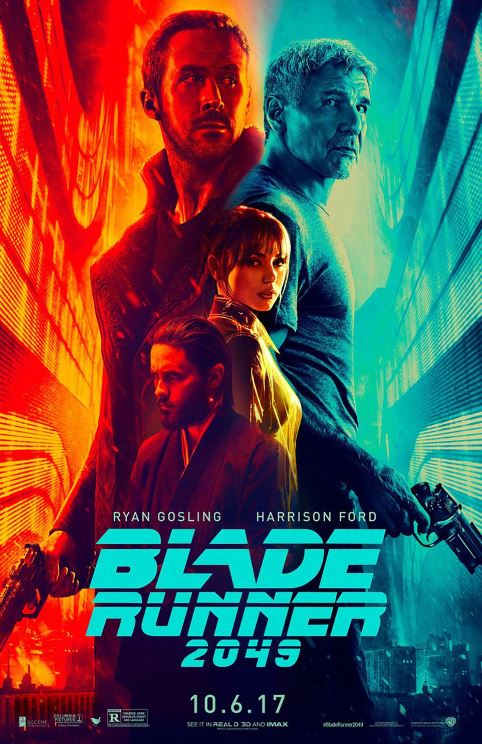Blade Runner 2049 Summary
Blade Runner 2049 is a science fiction film directed by Denis Villeneuve and is a direct sequel to the 1982 film Blade Runner. Set in a dyst future in 2049, the story follows a new Blade Runner called K, played by Ryan Gosling, who works for the LAPD. K’s job is to hunt down and “retire” (kill) old models of replicants, bioengineered humanoids created by the Tyrell Corporation.
During one of K’s missions, he uncovers a buried secret which could potentially disrupt the already fragile society. This leads him on a quest to find the truth behind it all. As K investigates further, he comes across a mysterious woman named Joi, an AI holographic companion, who provides him with emotional support throughout his journey.
Eventually, K finds himself on the track of former Blade Runner Rick Deckard, played by Harrison Ford, who has been missing for thirty years. Deckard holds the key to the secret that K has been pursuing. As K delves deeper into the mystery, he discovers a connection between himself and the enigmatic replicant rebel leader, Niander Wallace.
Throughout the film, K questions his own existence and struggles with his identity as a replicant. He also faces opposition from the authorities and the Wallace Corporation, who are determined to suppress the truth.
In the climactic final act, K confronts Wallace and learns that he himself is a replicant created by the Tyrell Corporation. He discovers that Deckard is the father of a replicant child, challenging the belief that replicants cannot reproduce. K sacrifices himself to save Deckard and reunite him with his daughter, fulfilling his arc of finding meaning and purpose in his seemingly artificial life.
Blade Runner 2049 explores complex themes such as artificial intelligence, the nature of humanity, and the blurred lines between replicants and humans. The film is known for its stunning visuals, introspective storytelling, and powerful performances by its cast.
Blade Runner 2049 Movie Plot
Blade Runner 2049 is a 2017 science fiction film directed by Denis Villeneuve and is a sequel to the 1982 original film, Blade Runner. The movie is set in a dystopian future Los Angeles in the year 2049. It follows the story of “K” (played by Ryan Gosling), a new generation of replicant Blade Runner, who is tasked with hunting down and retiring rogue and outdated replicants.
In the beginning, K comes across the buried remains of a female replicant, which is revealed to have given birth despite being previously believed to be incapable of having children. This discovery leads K’s superior, Lieutenant Joshi (played by Robin Wright), to order him to find and eliminate the child in order to prevent a potential revolution by replicants against humans.
As K investigates further, he crosses paths with Niander Wallace (played by Jared Leto), a powerful businessman and owner of the replicant manufacturing corporation, who has his own motivations to find the child. K seeks help from Rick Deckard (reprised by Harrison Ford), the original Blade Runner from the first film, who has been hiding in isolation for several years.
As K dives deeper into the mystery, he uncovers a bigger conspiracy involving the child, questioning his own existence, as well as the line between humans and replicants. He discovers that he himself might be the child, with implanted memories to hide his true identity.
The plot continues to unravel as K tries to protect the child while evading both the forces of Wallace and the Wallace Corporation, as well as fighting against the dystopian society ruled by human greed and oppression.
In the climax, K finds Deckard in an abandoned Las Vegas and confronts him with the truth about his past and his identity as the child. They unite to fight off Wallace’s forces who desire the child’s unique abilities. In the end, K sacrifices himself to save Deckard, ensuring the survival of the child who represents a new hope for the future.
The film explores themes of humanity, identity, and the nature of existence, while also paying homage to the philosophical questions raised in the original Blade Runner. It received critical acclaim for its stunning visuals, thought-provoking storyline, and engaging performances.

Main actors of Blade Runner 2049
Main actors of Blade Runner 2049 include:
- Ryan Gosling as Officer K/Joe
- Harrison Ford as Rick Deckard
- Ana de Armas as Joi
- Sylvia Hoeks as Luv
- Robin Wright as Lieutenant Joshi
- Jared Leto as Niander Wallace
- Mackenzie Davis as Mariette
- Carla Juri as Dr. Ana Stelline
- Lennie James as Mister Cotton
- Dave Bautista as Sapper Morton
Awards received by Actors. Blade Runner 2049
Blade Runner 2049, directed by Denis Villeneuve, was released in 2017 and received critical acclaim for its visuals, performances, and storytelling. While the film did not win any major acting awards, several of its cast members were recognized for their performances. Here are some of the awards received by actors from Blade Runner 2049:
- Golden Globe Awards:
- Best Supporting Actor – Motion Picture: Sam Rockwell (for his performance as Officer K)
- Best Original Score – Motion Picture: Hans Zimmer and Benjamin Wallfisch (for composing the film’s score)
2. BAFTA Awards:
- Best Cinematography: Roger Deakins (for his outstanding work as the cinematographer)
- Best Sound: Mark Mangini, Ron Bartlett, Doug Hemphill, and Mac Ruth (for their exceptional sound design and mixing of the film)
- Best Special Visual Effects: John Nelson, Paul Lambert, Richard R. Hoover, and Gerd Nefzer (for their groundbreaking visual effects)
3. Critics’ Choice Movie Awards:
- Best Cinematography: Roger Deakins
- Best Production Design: Dennis Gassner and Alessandra Querzola
- Best Visual Effects: John Nelson, Paul Lambert, Richard R. Hoover, and Gerd Nefzer
4. Satellite Awards:
- Best Art Direction and Production Design: Dennis Gassner
These are just a few of the awards received by the actors and crew members of Blade Runner 2049. The film was widely praised for its technical achievements and received numerous nominations in various categories at several award ceremonies.
Film Production
The film was produced by Andrew A. Kosove, Broderick Johnson, Bud Yorkin, and Cynthia Sikes Yorkin. It was a joint production between Alcon Entertainment, Scott Free Productions, and Warner Bros. Pictures.
The production of Blade Runner 2049 began in 2015, with Roger Deakins serving as the cinematographer. The film stars Ryan Gosling as Officer K, a blade runner who uncovers a long-buried secret that leads him to seek out former blade runner Rick Deckard, played by Harrison Ford.
The production team focused on capturing the dystopian future of the original Blade Runner, while also expanding the world and visuals of the film. The production design by Dennis Gassner received critical acclaim for its intricate and detailed sets, which showcased a futuristic Los Angeles.
Blade Runner 2049 also utilized advanced visual effects to create a realistic and immersive world. The visual effects were done by several acclaimed companies, including Framestore, MPC, and Double Negative.
The film had a production budget of $150-185 million and was released on October 6, 2017. Blade Runner 2049 received positive reviews from critics, who praised its visuals, performances, and continuation of the themes from the original film. Despite its critical success, the film underperformed at the box office, grossing $259 million worldwide.
Blade Runner 2049. Music
The music in Blade Runner 2049, composed by Hans Zimmer and Benjamin Wallfisch, is a crucial element that helps create the immersive and atmospheric world of the film. It beautifully complements the futuristic and dystopian visuals, enhancing the overall cinematic experience.
The score of Blade Runner 2049 can be described as a fusion of electronic, orchestral, and ambient elements. It pays homage to the iconic Vangelis score from the original Blade Runner while incorporating its own unique identity.
One of the defining features of the music is its use of synthesizers and electronic textures. These elements help to create a sense of otherworldliness and add a haunting quality to the score. Zimmer and Wallfisch masterfully combine these electronic sounds with traditional orchestral instruments, often blurring the line between the two.
The score also employs a lot of slow, brooding melodies, which add to the film’s dark and melancholic tone. These melodies often have an introspective quality, reflecting the inner struggles and existential questions faced by the film’s characters.
In addition to the original score, Blade Runner 2049 also incorporates songs that further contribute to its immersive atmosphere. Notable examples include “Suspicious Minds” by Elvis Presley and “Tears in the Rain” by Benjamin Wallfisch, which is a reimagined version of the iconic Vangelis piece from the original film.
Overall, the music in Blade Runner 2049 is an integral part of the film’s world-building, enriching the visuals and enhancing the emotional depth of the story. It successfully pays tribute to the original Blade Runner score while establishing its own identity, making it a standout component of the film.
Awards and Nominations. Blade Runner 2049
- Academy Awards:
- Won: Best Achievement in Cinematography (Roger Deakins)
- Won: Best Achievement in Visual Effects (John Nelson, Gerd Nefzer, Paul Lambert, and Richard R. Hoover)
- Nominated: Best Production Design (Dennis Gassner, Alessandra Querzola)
- Nominated: Best Sound Editing (Mark Mangini and Theo Green)
- Nominated: Best Sound Mixing (Ron Bartlett, Doug Hemphill, Mac Ruth)
- Nominated: Best Original Score (Hans Zimmer and Benjamin Wallfisch)
- BAFTA Awards:
- Won: Best Cinematography (Roger Deakins)
- Won: Best Special Visual Effects (Richard R. Hoover, Paul Lambert, Gerd Nefzer, and John Nelson)
- Nominated: Best Production Design (Dennis Gassner and Alessandra Querzola)
- Nominated: Best Sound (Ron Bartlett, Theo Green, Doug Hemphill, Mark A. Mangini, and Mac Ruth)
- Nominated: Best Original Music (Benjamin Wallfisch and Hans Zimmer)
- Critics’ Choice Movie Awards:
- Won: Best Cinematography (Roger Deakins)
- Won: Best Production Design (Dennis Gassner)
- Won: Best Visual Effects (John Nelson, Paul Lambert, Richard R. Hoover, and Gerd Nefzer)
- Nominated: Best Score (Hans Zimmer and Benjamin Wallfisch)
- Nominated: Best Editing (Joe Walker)
- Nominated: Best Art Direction (Alessandra Querzola)
- Golden Globe Awards:
- Nominated: Best Original Score (Hans Zimmer and Benjamin Wallfisch)
- Nominated: Best Director (Denis Villeneuve)
- Saturn Awards:
- Won: Best Science Fiction Film
- Won: Best Director (Denis Villeneuve)
- Won: Best Production Design (Dennis Gassner)
- Won: Best Visual Effects (Richard R. Hoover, Paul Lambert, Gerd Nefzer, and John Nelson)
- Nominated: Best Actor (Ryan Gosling)
- Nominated: Best Supporting Actor (Harrison Ford)
- Nominated: Best Writing (Hampton Fancher and Michael Green)
These are just a few of the awards and nominations that Blade Runner 2049 received. The film was widely praised for its stunning visuals, immersive storytelling, and the performance of its cast.
Reviews
Blade Runner 2049 is a visually stunning and thought-provoking film that serves as a worthy sequel to the 1982 cult classic Blade Runner. Directed by Denis Villeneuve, this movie embraces the neo-noir aesthetic and expands upon the complex themes of humanity, identity, and the nature of consciousness.
One of the biggest strengths of Blade Runner 2049 is its visuals. The cinematography by Roger Deakins is nothing short of breathtaking. Every frame is meticulously crafted and filled with rich details, creating a dystopian world that feels both familiar and alien. The use of colors, lighting, and visual effects is masterful, resulting in a visually immersive experience that stays with you long after the film ends.
The story in Blade Runner 2049 is equally captivating. It follows Officer K, a replicant played by Ryan Gosling, as he uncovers a secret that could have far-reaching consequences for replicants and humankind. The narrative is intricate and keeps you guessing until the very end. It successfully blurs the lines between what is real and what is artificial, raising profound questions about what it means to be human.
The performances in the film are superb. Ryan Gosling delivers a nuanced and introspective performance as Officer K, while Harrison Ford reprises his role as Rick Deckard with a pitch-perfect blend of weariness and determination. The supporting cast, including Ana de Armas, Sylvia Hoeks, and Jared Leto, also shine in their respective roles, each adding layers to the complex world of Blade Runner.
At almost three hours long, Blade Runner 2049 might be seen as a slow-burning film. However, this deliberate pacing allows for a deeper exploration of the themes and characters, giving the audience time to fully absorb the intricacies of the story. It may not be a film for those seeking fast-paced action, but for those who appreciate a thought-provoking and visually stunning experience, Blade Runner 2049 is a masterpiece.
Overall, Blade Runner 2049 is a triumph in filmmaking. It successfully pays homage to its predecessor while carving its own path, offering a thought-provoking story, stunning visuals, and exceptional performances. Whether you are a fan of the original Blade Runner or new to the series, this film is a must-watch for anyone who appreciates intelligent and visually striking cinema.
Trailer
Conclusion
Blade Runner 2049 is a visually stunning and intellectually profound sequel to the iconic original movie.
With its stunning cinematography, intricate storytelling, and thought-provoking themes, the film successfully captures the essence of its predecessor while also charting its own path.
The performances, particularly from Ryan Gosling and Harrison Ford, are excellent and the world-building is immersive and fully realized.
Blade Runner 2049 invites audiences to contemplate the nature of humanity, identity, and the potential consequences of technological advancement. It is a cinematic experience that lingers in the mind long after the credits roll, reaffirming its status as a true sci-fi masterpiece.

